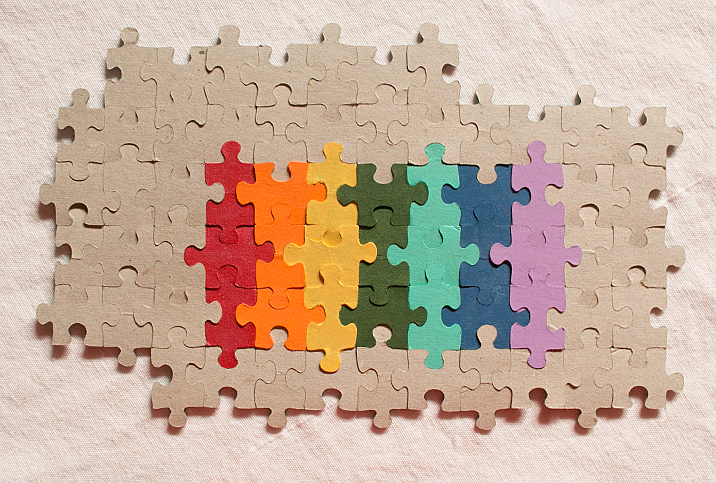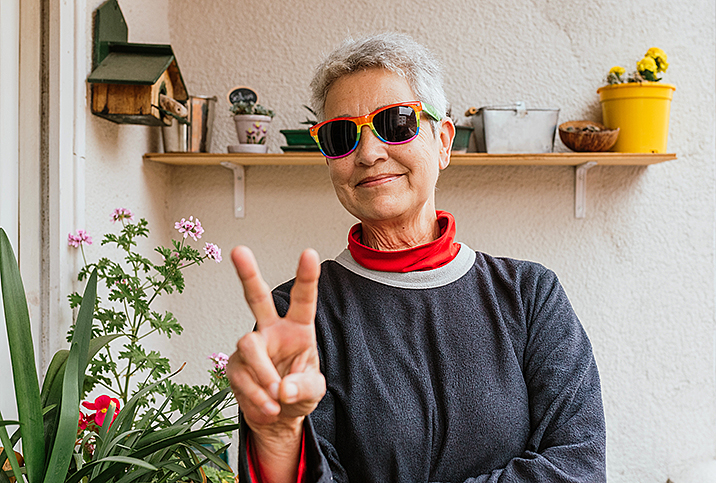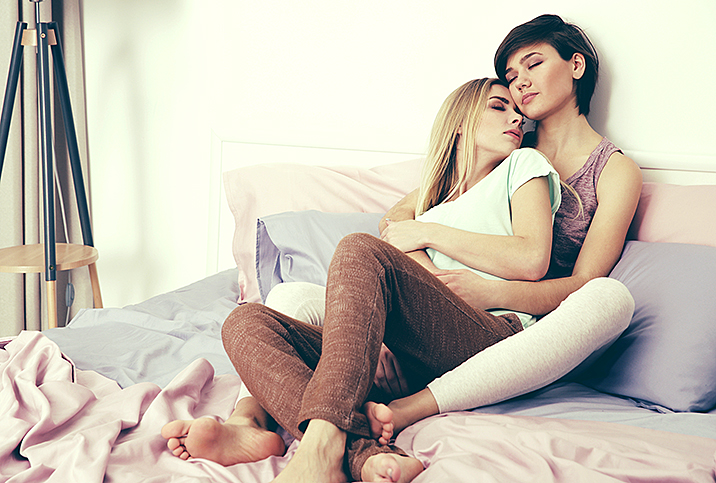Why Are Mortality Rates Higher for Lesbian and Bisexual Women?

Key Points
- Lesbian and bisexual women have a higher risk of various negative health outcomes.
- It appears that lesbian and bisexual women tend to die significantly earlier, according to a new, long-term study..
- The causes of a higher mortality rate are multifactorial but include systemic discrimination, social stigma, stress and isolation.
It's well-established that members of the LGBTQIA+ community tend to face more health challenges than their cisgender, heterosexual peers.
A new study underscores how tragic the consequences can be, indicating lesbian and bisexual women die much earlier compared to heterosexuals. The study authors suggest that social stigma and prejudice are two leading reasons this happens.
Do lesbian and bisexual women die earlier than heterosexual women?
Women who identified as lesbian died 20 percent sooner than heterosexuals, while bisexual women died 37 percent sooner, indicated the 2024 study in JAMA Network.
The analysis included decades' worth of data from the Nurses' Health Study II, which investigated risk factors for chronic diseases in women and included data from more than 100,000 nurses in the United States.
As part of that study, which began in 1989, participants were asked about their sexual orientation in 1995. Researchers examined 30 years of death records to determine participants' lifespans and how that related to sexual orientation in the 2024 paper.
"The Nurses' Health Study II's size and timespan allowed researchers to evaluate lesbian and bisexual participants separately, which no previous U.S. study had done," Sarah McKetta, a postdoctoral research fellow at Harvard and the new study's lead author, told NBC News.
"In the U.S., it wasn't the norm to incorporate information about study participants' sexual orientation until 2014, which has made it difficult for researchers to investigate premature death rates among sexual minorities," she said.
Why are lesbian and bisexual women dying earlier?
LGBTQIA+ people, especially women, experience significant physical and mental health disparities compared to cisgender and heterosexual people, indicated a 2021 review.
These challenges tend to impact members of the LGBTQIA+ community throughout their lifetimes, from adolescence to older adulthood, and negatively affect their overall health and quality of life.
"These systemic and highly reproducible disparities encompass nearly all negative health outcomes, including chronic disease, mental health problems and risky behaviors such as alcohol use and smoking," McKetta told NBC News.
"Pretty much any outcome that we've looked at across multiple surveys, we see that lesbian, gay and bisexual women are at higher risk," she said, adding that the new study was an opportunity to quantify the magnitude of those disparities.
The new research indicated women who identified as lesbian or bisexual were twice as likely as heterosexuals to use alcohol or tobacco and had higher rates of breast cancer, cardiovascular disease and depression.
Additional analysis based solely on participants who'd never smoked, the gaps in mortality rates remained.
Recommended
- From the Closet to the Podium: Assimilation and deviation contributed equally to building acceptance of the LGBTQIA+ community.
- How to Find a Queer-Friendly Family Doctor: You deserve comprehensive and compassionate care, regardless of your sexuality.
- What Does It Actually Mean to Be Sex-Positive?: A certified sex therapist explains.
What are the risk factors affecting the life spans of lesbian and bisexual women?
Multiple factors are likely contributing to the death rate disparities, according to the study authors.
"For one, many LGBTQIA+ people experience prejudice, discrimination and social stigma, which causes chronic stress," said Carey Candrian, Ph.D., vice president of the Lesbian Health Fund at the Gay and Lesbian Medical Association (GLMA).
Extensive research has shown the toll chronic stress can take on the body, contributing to various health issues, including cardiovascular disease and mood disorders.
"Making matters worse, many people turn to unhealthy coping mechanisms, particularly if they feel isolated," Candrian said. "I think one of the things the [study] does well is show the impact of compounding stress levels from internalized stigma, which I think is really significant."
Many people fear disclosing their identity and its impact on various facets of life, including family, work, personal relationships, housing and financial security.
"That fear affects physical and mental health and people's ability to have authentic friendships and community–pillars of health and quality of life," Candrian said. "The fear that, if they are open, does that mean they'll lose their jobs? Is that going to mean they lose their family?"
"Those are serious fears that have concrete health effects on people. And I think women in general have historically been marginalized, so when you add on these other identities, like lesbian and bisexual, it just magnifies it all," Candrian said.
Additionally, many LGBTQIA+ people have difficulty seeking medical care due to systemic barriers and fear of discrimination by individual providers.
"That may mean they miss opportunities to address health problems early—when they're more treatable—or prevent them altogether," Candrian said.
Homophobia and transphobia can indirectly raise the chances of LGBTQIA+ people getting cancer, for example, according to a 2024 report from the American Cancer Society (ACS).
"They have a really bad history of dealing with the medical system, and so they tend to put off care at much higher rates than heterosexual people, which also impacts their mortality," she said.
As for why bisexual women tend to die sooner than lesbians, research shows women who experience attraction to more than one gender tend to have poorer physical and mental health and are at greater risk of substance abuse and sexual violence.
"In part, this may be attributable to the added stress of facing biphobia from within the LGBTQIA+ community and broader society," Candrian said. "They get stigmatized a lot for being 'confused,' which is awful."
"Bisexual people are often excluded from certain groups because they're assumed to be straight or gay based on their partner's gender," said Brittany Charlton, senior author of the study and associate professor at Harvard University, in a news release.
"These factors can further inhibit bisexual people's ability to feel a sense of belonging and community," Candrian said.
"One of the things that I was worried about with this study is that the takeaway would be that it kills to be gay," McKenna told NBC News. "It doesn't kill to be gay. It kills to be discriminated against. And that's the lived experience of lesbian and gay women and bisexual women who are just trying to walk through the world."
How can lesbian and bisexual women improve their mental health outcomes?
"The onus should be on society and healthcare systems, not individual people, to improve outcomes for women who identify as lesbian or bisexual," Candrian said. "It's not OK to put the burden on these people. It's critical first to ensure healthcare systems are safe and welcoming."
"Healthcare providers must recognize how critical it is for people to be able to disclose their identities without fear and then communicate their understanding and acceptance to the LGBTQIA+ community. Although it's not lesbian and bisexual women's responsibility, they can help to drive that change by advocating for better care," Candrian said.
She added that there needs to be a greater understanding that fear and stigma toward LGBTQIA+ people are "literally taking years off" of their lives.
Candrian also recommended that lesbian and bisexual women avoid drinking excessively or smoking and try to find ways of connecting with other gay and bisexual women that don't involve these activities.
"Community can act as a different type of protective factor against physical and mental illnesses. We can't underestimate how powerful it is to have community because it immediately relieves the stress of having to hide," she said. "That goes a long way."
Many state and local municipalities have established LGBTQIA+ groups. But if one doesn't exist in your area, consider advocating for one and perhaps even volunteering to help create one.
National groups can provide resources. These include:
- The Trevor Project
- SAGE
- The National Center for Lesbian Rights
- The National LGBTQ Task Force
- Mental Health America
Embracing your identity can likewise go a long way toward improving your mental health, according to Mind U.K., a nonprofit based in England and Wales that focuses on helping people disproportionately affected by mental health challenges—including members of the LGBTQIA+ community.
In addition to speaking with trusted friends, family members and others within the LGBTQIA+ community, working with a therapist specializing in LGBTQIA+ experiences may help you to do so.
The bottom line
Although the study's findings are grim, Candrian noted that the research reflects a growing interest in understanding sexuality and its connection to health, which is significant.
If you are a lesbian or bisexual woman, speak with a healthcare provider to take charge of your health. If you need a provider, the GLMA LGBTQ+ Healthcare Directory may help you find one.


















